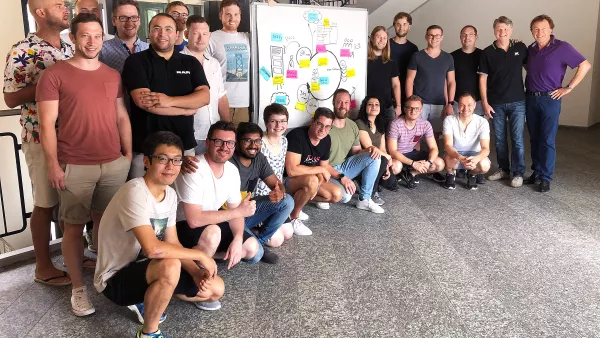
More and more companies align their organization and work culture with agile principles to respond adequately to digital transformation. Scrum is the most widely used concept and tool worldwide to make companies agile. The term Scrum is borrowed from Rugby. However, in a figurative sense, the emphasis is on interaction and cooperation, on the self-organization of a team.
Agility, i.e., the ability to react quickly to changes in the global marketplace, is becoming a key competence of successful companies. Agile process models such as Scrum are revolutionizing product development and project management in the long term. The advantages of agile or Scrum-based product or project management are:
- High transparency.
- A better overview for all project participants.
- Shortened time-to-market deliveries.
Functional results are available to the market and customers in short intervals, and product innovation is combined with efficiency in a dialog and consensus-oriented manner. Based on the “feedback” from the market, Scrum teams can build quickly, efficiently, and innovatively through cycles called sprints.
During a weekend workshop of the part-time MBA program “International Business Management” (IB), 25 students had the unique opportunity to know Scrum as an agile process framework and method for developing complex products and trying it out practically in heterogeneous teams. Professor Dr. Eberhard Hohl has first realized this workshop format at RWU in 2017. Professor Dr. Eberhard Hohl, responsible for the modules Management Concepts, Systems, and Leadership, at RWU has a long-standing cooperation with Jean-Pierre Berchez, one of Germany’s pioneers of agile product development. Mr. Jean-Pierre Berchez has worked together with the inventors of Scrum, the US-Americans Dr. Jeff Sutherland and Ken Schwaber, in the 90s. Today, he heads the consultant network “Scrum Events,” organizes the German user conference “Scrum Day,” and works as a Scrum trainer and coach in well-known companies.
“One of the highlights of this semester”
Mr. Berchez actively involved the participants in exercises and role-plays and made Scrum tangible from the start. In five Scrum teams, they learned the Scrum theory, the framework’s elements with the roles, artifacts, and events on the practical case in a motivating way. The students actively simulated and presented a product development from the product vision to product controlling and long-term planning using the practical example “development of an app.” The product development presentation was done by the respective development teams “on stage” and in front of the jury consisting of Jean-Pierre Berchez and Eberhard Hohl. The 5-minute pitches were followed by 3-minute question rounds and subsequent feedback from the judges.
In addition to these real-world workshop experiences, MBA students will have the “exclusive” opportunity to complete their newly acquired knowledge with a Scrum Master certification.
The final discussion showed that the success of the “Scrum” method lies in promoting cooperation between the client and the development teams based on the “Agile Manifesto.” In multiple iterations, the organization progresses incrementally, i.e., step by step. It became clear that Scrum can also positively influence the change to agile leadership and corporate culture - through active involvement, high motivation, and identification of the stakeholders.
“The weekend was one of the highlights of this semester,” said Jan Bolender. “With his expert knowledge and through hands-on delivery, Jean-Pierre Berchez gave us a deep insight into the world of Scrum. In addition, it was stimulating to see the positive impact Scrum can have in the daily working world and very different professions. Those were two inspiring days.”